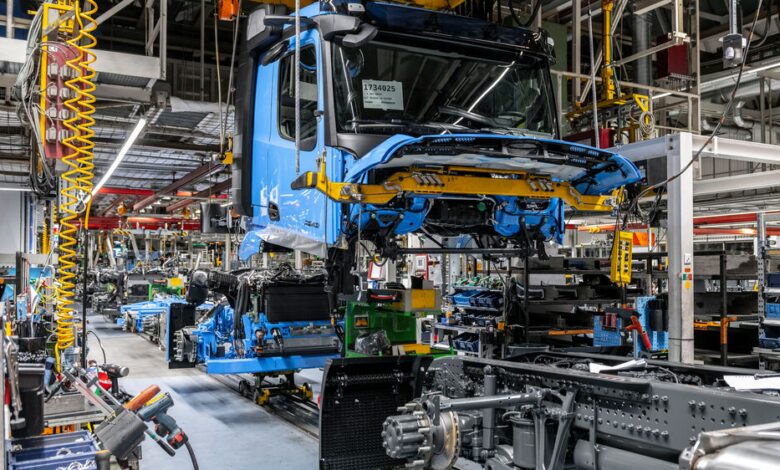Artificial intelligence is becoming practical.

Smart Factory Day 2024
Artificial intelligence is making its way into production
From
Tina Rumpelt
Thomas Günnel | Translated by AI
How does AI work in manufacturing practice? About 120 experts exchanged views on this at the Smart Factory Congress organized by Geman special magazine “Automobile Industry”.
(Image: Daimler Truck AG)
“Artificial intelligence is like a teenager. You never know what will happen and whether you need to worry,” said Gerhard Keller, Head of Auto & Industry Germany at Google Cloud – earning a good deal of chuckles from around 120 participants at the Smart Factory Day 2024 in Karlsruhe, Germany. However, the congress also showed: Things are getting serious with AI in automotive production – almost all-encompassing from quality assurance, process planning and logistics to securing the supply chain. Nine speakers illuminated the state of AI development and shared their practical experiences.
Exclusive tours: research factory and manufacturing practice
The “theoretical part” in the lecture hall was supplemented by two exclusive on-site appointments that lead the conference participants to the Karlsruhe Research Factory for AI-integrated production and to the Daimler Truck plant in Wörth. Plant manager Manuel Bögel made it exciting: “Our truck production is in a massive transformation.” New e-truck models are being integrated into the existing production on a step-by-step basis.
This year sees the launch of the E-Actros 600, Daimler Truck’s first battery-electric long-haul trucks with a range of up to 600 kilometers (approx. 373 miles). In Europe’s largest truck factory, with around 10,000 employees and a capacity for 470 trucks per day, artificial intelligence is becoming increasingly important in quality assurance and production control.
That the “teenager” artificial intelligence will become an adult very soon, despite its current childish immaturity, was agreed upon by the experts. The only question is, how quickly will this happen? “We have no idea about the pace of further development; but it will happen very, very quickly,” Bernd Mangler, SVP Automotive, Battery, Projects at Siemens AG, is convinced.
“More Chinese courage”
In other regions of this world, innovations are often implemented faster than in Europe, Mangler showed. Dieter Stenkamp, Automotive Operations Manager at SEW-Eurodrive, explicitly called for “more Chinese courage” in the panel discussion. The challenge is to keep up with the established pace, to enter into cooperations with experts, in short, to act now: “If you want to learn to swim, you have to go into the water.”
Mangler appealed to the participants to drive AI projects in a practice-oriented manner. “It only becomes innovation when we can scale the AI technologies and use them on the shop floor.” Google manager Keller also advises those responsible: “You have to use real data scientists at the operational front and not just in staff positions.” The auto industry can also learn “fail fast” from the digital world: “Bury projects with pride – and move on elsewhere.”
“Data democratization” for faster solutions
Sebastian Jonas, Head of New Production Concepts at Schaeffler, reported on an AI-supported, automated assembly process for complex gearbox components, which tellingly was first implemented in a Chinese Schaeffler factory. “We need to understand and examine what is scalable,” he said.
He warns against blind zeal: “A bad process that is digitalized is still a bad process.” Also important, according to Jonas, is a “data democratization”. Siemens manager Mangler put it more drastically: “Anyone who needs 20 signatures for a release can forget about digitalization.”
Without human creativity, there is no artificial intelligence
Olaf Sauer appealed to the participants not to neglect people in all the AI euphoria. “Human creativity is indispensable for the further development of AI,” said the deputy institute director, business unit automation and digitalisation, at the Fraunhofer IOSB. Or as it can be read in an IOSB brochure: “Artificial intelligence will become part of every production-related IT system. But it will always be people who evaluate and make decisions.”
The IOSB operates the Karlsruhe Research Factory together with the Fraunhofer ICT and the Wbk Institute for Production Technology at the Karlsruhe Institute of Technology, KIT. On 5,000 square metres of production space, the scientists, together with industry and research partners, focus on industry-related AI projects. The main topics are Industry 4.0, lightweight construction and electric mobility/battery systems.
“Making processes quickly usable in production”
“The offer of the research factory: ‘Optimize established processes and make ‘immature’, not fully understood processes quickly productive,’ explained Sauer. He advocated joint projects, in which employees of partner companies could also be active on-site, in the ‘factory’.”
The conference participants discussed on site with project managers, among other things, a modular assembly concept for battery cells, the disassembly of electric starter motors performed by collaborative robots, the use of Digital Twins, data exchange in data rooms like Catena-X and an “intelligent” supplier platform for “Manufacturing-as-a-Service”.
Broad expertise among the exhibitors
Use cases that are already in customer use were presented by Nicholas Baldwin from Rockwell Automation Solutions (cloud-based Smart Manufacturing Platform), Harald König from Shyftplan (AI-supported shift planning in real time) and Arnd Grootz from PSI FLS Fuzzy Logistics & Neuro Systems, along with Gianluca Di Buo from hardware cooperation partner Idea (including mobile, smart robots for predictive maintenance).
Interested parties found contacts for individual questions in an exhibition accompanying the congress. In addition to the companies mentioned, the exhibitors included Advantech, a provider of industrial IoT technologies, the software providers Aunovis and Oniq, the South Korean start-up Aimmo, an expert in deep-learning-based data services, and Vision Tools image analysis systems.
Product and process quality in focus
Rockwell manager Baldwin also reported on a customer survey with 1,500 participants, according to which 83 percent of the companies surveyed want to implement generative AI projects in 2024. 45 percent of those surveyed plan to use AI tools in quality assurance and 39 percent in process optimization. Cybersecurity (40 percent), resource management (34 percent), and robotics (33 percent) were also mentioned as other favored areas of application.
“Live Show”: AI in Daimler Truck Manufacturing
To conclude the Smart Factory Day 2024, the participants had the chance to experience the practical application of AI tools in quality control at the Daimler Truck production site in Wörth. There, AI tools are used not only to locate the vehicles in production to within one meter and coordinate process steps accordingly; they also control, for example, the model-specific different screw connections through AI-supported quality assurance processes.
A rather complex task due to the large variety of models in truck manufacturing: Wörth produces 460 body variants alone. 31 gearbox variants, 40 rear axle types and 54 front axle types; and more than a million different wiring harnesses are installed.
Gallery
Robots set approximately 3,900 welding points on each driver’s cabin. Up until now, these connections have been subject to ultrasonic inspections in random samples. AI can do more. Plant manager Bögel: “We have collected the measurement data of the welding points for three years. Artificial intelligence independently detects anomalies based on this data as a black box and analyzes them.”



